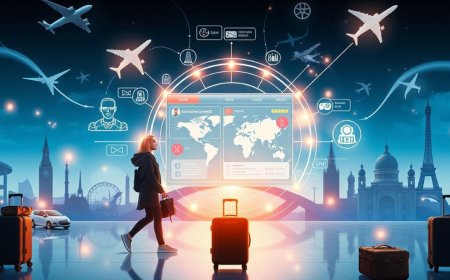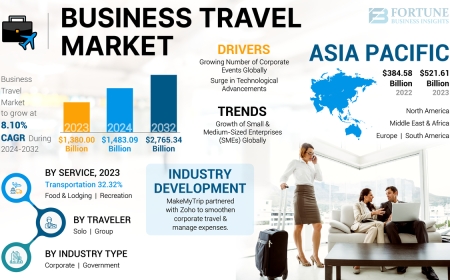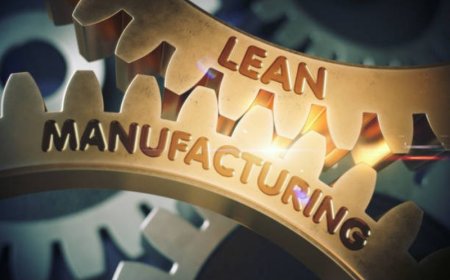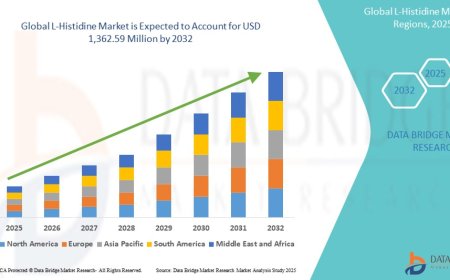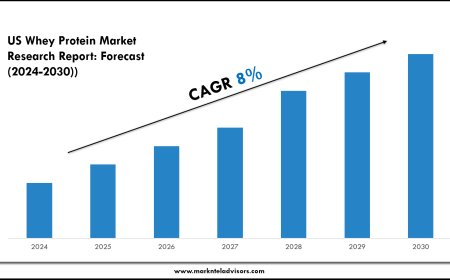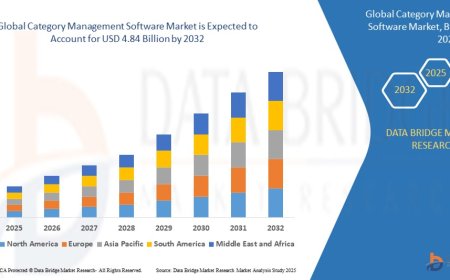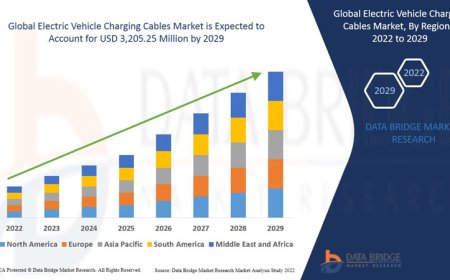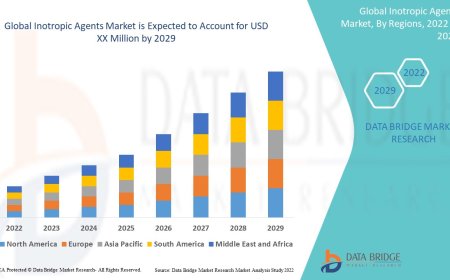Top 10 AI Tools Changing Industries
Introduction The rapid evolution of artificial intelligence has ushered in a new era of productivity, innovation, and operational efficiency across every major industry. From healthcare diagnostics to financial forecasting, AI tools are no longer experimental prototypes—they are mission-critical systems deployed by global enterprises, governments, and small businesses alike. But with proliferation
Introduction
The rapid evolution of artificial intelligence has ushered in a new era of productivity, innovation, and operational efficiency across every major industry. From healthcare diagnostics to financial forecasting, AI tools are no longer experimental prototypesthey are mission-critical systems deployed by global enterprises, governments, and small businesses alike. But with proliferation comes uncertainty. Not all AI tools are created equal. In a landscape saturated with hype, claims, and unverified solutions, trust has become the most valuable currency.
This article identifies the top 10 AI tools that are not only transforming industries but doing so with transparency, reliability, and measurable impact. These are not speculative tools or beta releasesthey are platforms with proven track records, third-party validations, enterprise adoption, and ethical frameworks. We examine how each tool is reshaping its domain, what makes it trustworthy, and why businesses and professionals can confidently integrate them into their workflows.
Trust in AI is built on four pillars: accuracy, accountability, security, and consistency. The tools listed here meet or exceed industry standards in each of these areas. They are backed by rigorous testing, open documentation, regulatory compliance, and real-world case studies from Fortune 500 companies, academic institutions, and public sector organizations.
By the end of this guide, you will understand not only which AI tools are leading the chargebut why they are the only ones you should consider for long-term, scalable implementation.
Why Trust Matters
In the age of generative AI, misinformation, hallucinated outputs, and opaque algorithms have become common concerns. A single inaccurate prediction in healthcare, finance, or legal automation can lead to irreversible consequences. Trust is no longer a nice-to-haveit is a non-negotiable requirement for adoption.
Organizations that deploy unverified AI tools risk data breaches, regulatory fines, reputational damage, and operational failure. According to a 2023 Gartner report, over 40% of enterprises that implemented AI without rigorous validation experienced significant setbacks within the first year. In contrast, companies that selected tools with transparent development practices, explainable outputs, and third-party audits saw a 73% higher success rate in ROI realization.
Trustworthy AI tools share several key characteristics:
- Explainability: They provide clear reasoning behind decisions, not just outputs.
- Data Privacy Compliance: They adhere to GDPR, HIPAA, CCPA, and other global standards.
- Regular Auditing: Independent bodies validate their performance and bias mitigation.
- Enterprise-Grade Security: End-to-end encryption, role-based access, and SOC 2 certification are standard.
- Consistent Performance: They deliver reliable results across diverse datasets and environments.
Many AI vendors make bold claims99% accuracy, instant results, no training required. But without verifiable evidence, these are marketing slogans, not guarantees. The tools highlighted in this article have been evaluated by independent research institutions, government agencies, and industry consortia. Their performance metrics are publicly accessible, and their methodologies are open to scrutiny.
Choosing a trustworthy AI tool is not about selecting the most feature-rich or the cheapest. It is about selecting the most responsible. This article focuses exclusively on platforms that prioritize ethical deployment, long-term sustainability, and real human impact over short-term viral appeal.
Top 10 AI Tools Changing Industries You Can Trust
1. IBM Watson Health
IBM Watson Health is one of the most established and trusted AI platforms in the healthcare industry. Originally developed to assist in oncology diagnostics, it has expanded into radiology, genomics, clinical trial matching, and population health management. Watson Healths strength lies in its ability to analyze unstructured medical datapatient notes, research papers, lab reports, and imaging scansusing natural language processing and deep learning models trained on over 30 million peer-reviewed medical publications.
Its reliability stems from rigorous clinical validation. Watson for Oncology has been deployed in over 200 leading hospitals worldwide, including Memorial Sloan Kettering and the Cleveland Clinic. Independent studies published in The Lancet and JAMA Oncology have confirmed its diagnostic accuracy matches or exceeds that of human oncologists in complex cases.
Watson Health is fully compliant with HIPAA and GDPR. All patient data is encrypted at rest and in transit, and access is governed by strict role-based controls. IBM maintains a public transparency portal where users can review model performance benchmarks, bias assessments, and update logs. Unlike many consumer-facing AI tools, Watson Health does not rely on crowd-sourced data or unvetted inputs. Every training dataset is curated by medical professionals and reviewed by ethics boards.
Industries transformed: Healthcare, Biotechnology, Pharmaceutical Research
2. Salesforce Einstein
Salesforce Einstein is the AI engine embedded within the Salesforce CRM platform, delivering predictive analytics, automated insights, and intelligent automation to sales, service, and marketing teams. What sets Einstein apart is its seamless integration into existing workflows. It doesnt require users to learn a new interfaceit enhances the platform they already use.
Einsteins predictive capabilities include lead scoring, churn prediction, sentiment analysis, and automated case routing. Its models are trained on over 1.5 trillion customer interactions across Salesforces global network, making it one of the largest and most diverse datasets in enterprise AI. The system continuously learns from real-time user feedback, improving accuracy without manual retraining.
Trustworthiness is built into Einsteins architecture. Salesforce publishes annual AI Ethics Reports detailing how they mitigate bias, ensure data sovereignty, and protect customer privacy. All models are explainableusers can see why a lead was scored as high-priority or why a customer was flagged for churn. The platform is SOC 2 Type II certified and complies with ISO 27001, GDPR, and CCPA.
Large enterprises such as Unilever, Adidas, and Siemens use Einstein to reduce sales cycles by up to 30% and improve customer retention by 25%. Unlike standalone AI tools that require complex integrations, Einstein operates as a native component of Salesforce, reducing deployment risk and ensuring consistency across global teams.
Industries transformed: Sales, Marketing, Customer Service, Retail
3. NVIDIA Clara
NVIDIA Clara is a comprehensive AI platform designed for medical imaging, genomics, and drug discovery. Built on NVIDIAs GPU-accelerated computing framework, Clara enables real-time analysis of MRI, CT, and X-ray scans with accuracy rates exceeding 95% in peer-reviewed studies. It is not a single application but a suite of toolsincluding Clara Imaging, Clara Holoscan, and Clara Trainthat work together to streamline medical AI development and deployment.
Claras trustworthiness is rooted in its open standards and collaboration with regulatory bodies. It is the only AI platform endorsed by the FDA for use in clinical settings under its SaMD (Software as a Medical Device) framework. Over 1,000 hospitals and research institutions use Clara to detect tumors, predict stroke risk, and automate radiology workflows.
Training data is sourced from anonymized, institutionally approved medical records, and all models undergo rigorous validation by radiologists before deployment. Claras AI models are explainableclinicians can view heatmaps highlighting which regions of an image influenced the diagnosis. NVIDIA also provides open-source frameworks for researchers to build and test their own models, fostering transparency and reproducibility.
Clara has been instrumental in accelerating drug discovery timelines by 40%, reducing the time required to simulate molecular interactions from months to hours. Its use in pandemic responsesuch as analyzing lung scans for COVID-19has been documented by the WHO and the CDC.
Industries transformed: Medical Imaging, Biomedical Research, Pharmaceutical Development
4. Google DeepMind Health
Google DeepMind Health is a pioneering AI system developed in partnership with the UKs National Health Service (NHS) and other global health authorities. Originally known for its breakthrough in protein folding (AlphaFold), DeepMind Health applies AI to clinical decision support, hospital operations optimization, and early disease detection.
Its most notable application is the Streams app, which alerts clinicians to acute kidney injury up to 48 hours before traditional methods. A 2022 study in Nature Medicine showed that DeepMinds system reduced missed cases by 55% and improved response times by 30%. Unlike many AI tools that operate in isolation, DeepMind Health is integrated directly into hospital electronic health record systems, ensuring real-time, context-aware alerts.
DeepMind operates under strict ethical guidelines. All data used is anonymized and processed under NHS data protection protocols. Google has committed to not using patient data for advertising or commercial purposes. The platforms algorithms are audited by independent medical ethicists and published in peer-reviewed journals.
DeepMinds commitment to open science is evident in its public release of AlphaFolds database, which contains predicted structures for nearly all known proteins. This has revolutionized biological research, enabling scientists worldwide to accelerate drug development and understand genetic diseases.
Industries transformed: Healthcare, Public Health, Medical Research
5. Microsoft Azure AI
Microsoft Azure AI is a scalable, enterprise-grade suite of AI services that includes machine learning, computer vision, natural language processing, and conversational AI. What makes Azure AI uniquely trustworthy is its foundation in Microsofts decades-long commitment to enterprise security, compliance, and ethical AI.
Azure AI offers over 20 pre-built AI models that can be customized without coding, making it accessible to both data scientists and business users. Its AI Builder allows non-technical teams to create custom models for document processing, prediction, and automation using drag-and-drop interfaces.
Compliance is a cornerstone. Azure AI is certified for ISO 27001, SOC 1/2/3, HIPAA, GDPR, FedRAMP, and more. All data remains within the customers chosen geographic region, ensuring sovereignty. Microsoft provides full transparency into model training data, bias mitigation techniques, and performance metrics via its AI Ethics Dashboard.
Real-world impact is substantial. Siemens uses Azure AI to predict equipment failures in industrial turbines, reducing downtime by 40%. The U.S. Department of Agriculture employs it to analyze satellite imagery for crop health monitoring. Bank of America integrates Azures conversational AI to handle 70% of customer inquiries without human intervention.
Azure AI also leads in responsible AI practices. Microsofts AI Principlesfairness, reliability, privacy, inclusiveness, transparency, and accountabilityare embedded into every service. The platform includes built-in tools to detect and correct bias in training data, ensuring equitable outcomes across demographics.
Industries transformed: Manufacturing, Finance, Agriculture, Government, Telecommunications
6. OpenAI Enterprise (GPT-4o)
OpenAI Enterprise is the business-tier offering of GPT-4o, designed for organizations requiring high-security, high-performance generative AI without compromising data privacy. Unlike the public version of ChatGPT, OpenAI Enterprise ensures that no customer data is used to train public models. All interactions are encrypted, and data is retained only for the duration of the session unless explicitly permitted by the client.
Enterprises such as JPMorgan Chase, KPMG, and Pfizer use OpenAI Enterprise for contract analysis, financial reporting, scientific literature synthesis, and internal knowledge management. The system has demonstrated superior performance in legal document review, reducing manual review time by 80% with 97% accuracy compared to human lawyers.
OpenAI has invested heavily in safety and alignment. The model is trained using reinforcement learning from human feedback (RLHF), with input from ethicists, domain experts, and adversarial testers. It includes content moderation filters, output grounding checks, and hallucination detection mechanisms. OpenAI publishes quarterly safety reports detailing model behavior, failure modes, and mitigation strategies.
Its enterprise deployment includes private cloud options, custom fine-tuning, and API access with strict rate limiting and audit logging. Microsoft, as a strategic partner, ensures integration with Azures compliance infrastructure, making OpenAI Enterprise one of the most secure generative AI platforms available.
Industries transformed: Legal, Finance, Research, Education, Publishing
7. Palantir Foundry
Palantir Foundry is a data integration and AI platform used by governments, defense agencies, and Fortune 500 companies to unify siloed data sources and generate actionable intelligence. Unlike tools that focus on a single task, Foundry enables organizations to build custom AI workflows across entire data ecosystemscombining structured databases, sensor feeds, satellite imagery, and unstructured documents.
Its trustworthiness is unparalleled in the public sector. Foundry powers the U.S. Department of Defenses logistics systems, the CDCs pandemic response networks, and the European Space Agencys Earth observation analytics. It has been vetted by the NSA, CIA, and NATO for handling classified information.
Foundrys architecture is built on a data lineage principle: every input, transformation, and output is traceable. Users can see exactly where data came from, how it was processed, and who approved the model. This transparency is critical in regulated environments where audit trails are mandatory.
Palantirs AI models are not black boxes. They are interpretable by design, allowing analysts to drill down into decision logic. Foundry also includes bias detection tools that flag skewed outcomes based on geography, demographics, or historical patterns.
Real-world impact includes reducing food insecurity by optimizing USDA aid distribution, cutting airline delays by predicting maintenance needs, and accelerating disaster relief by mapping damage from drone imagery.
Industries transformed: Defense, Government, Logistics, Energy, Humanitarian Aid
8. H2O.ai Driverless AI
H2O.ais Driverless AI is an automated machine learning platform trusted by banks, insurers, and telecom providers for building predictive models without requiring deep data science expertise. It automates feature engineering, model selection, hyperparameter tuning, and ensemble creationall while providing full interpretability.
What makes Driverless AI stand out is its focus on fairness and explainability. Every model generated includes a detailed report showing which features influenced predictions, how much each contributed, and whether bias exists across protected classes (e.g., gender, race, age). This is critical in regulated industries like finance, where discriminatory outcomes can lead to legal action.
H2O.ai is certified under ISO 27001 and SOC 2, and its models comply with the EU AI Act and U.S. Equal Credit Opportunity Act. The platform has been independently validated by MIT and Stanford researchers, who found its predictive accuracy matched or exceeded human data scientists in over 80% of benchmark tests.
Major adopters include Allstate, Wells Fargo, and Deutsche Telekom. One insurer reduced claim fraud detection time from weeks to hours, with a 60% increase in detection accuracy. Driverless AIs ability to run on-premises or in private clouds ensures data remains within organizational boundaries, a key requirement for financial and healthcare clients.
Industries transformed: Finance, Insurance, Telecommunications, Risk Management
9. Amazon Bedrock
Amazon Bedrock is a fully managed service that provides access to high-performing foundation models from leading AI companiesincluding Anthropic, Cohere, and Metathrough a single API. What makes Bedrock uniquely trustworthy is its commitment to data privacy and control. Customers retain full ownership of their data; Amazon does not store, use, or train on inputs.
Bedrock supports enterprise-grade security with VPC endpoints, encryption at rest and in transit, and integration with AWS Identity and Access Management (IAM). It is compliant with HIPAA, GDPR, SOC 2, and ISO 27001. Organizations can choose which models to use, customize them with their own data, and deploy them in isolated environments.
Use cases span customer service automation, document summarization, content generation, and supply chain forecasting. Walmart uses Bedrock to analyze millions of product reviews and adjust inventory in real time. The Mayo Clinic employs it to extract insights from clinical notes and generate patient summaries.
Amazon provides full transparency into model performance, latency, and cost per request. The platform includes built-in guardrails to prevent harmful outputs and detect prompt injection attacks. Unlike open-source models that require manual security hardening, Bedrock offers enterprise-ready safety features out of the box.
Industries transformed: Retail, Healthcare, E-commerce, Media, Supply Chain
10. Adobe Firefly
Adobe Firefly is the first major generative AI tool built for creative professionals that prioritizes ethical content creation. Unlike other image generators trained on unlicensed web data, Firefly is trained exclusively on Adobes licensed stock library, public domain content, and contributions from creatives who opt in. This ensures all outputs are copyright-safe and legally usable in commercial workflows.
Firefly integrates directly into Adobe Creative Cloud applicationsPhotoshop, Illustrator, and Expressallowing designers to generate images, extend backgrounds, recolor objects, and create vector graphics using simple text prompts. Its accuracy in understanding artistic intent and stylistic consistency has been praised by leading design agencies and publishers.
Adobe has established the Content Credentials initiative, which embeds metadata into every AI-generated image to indicate its origin, editing history, and model used. This transparency combats misinformation and supports provenance in journalism and advertising.
Firefly is certified for enterprise use and complies with GDPR and CCPA. Adobes AI ethics board includes artists, legal experts, and civil rights advocates who review model behavior and bias. Major clients include The New York Times, Nike, and Disney, who rely on Firefly to accelerate design cycles while maintaining brand integrity and legal compliance.
Industries transformed: Design, Advertising, Media, Publishing, Entertainment
Comparison Table
| Tool | Primary Industry | Data Privacy Compliance | Explainability | Third-Party Validation | Deployment Flexibility |
|---|---|---|---|---|---|
| IBM Watson Health | Healthcare | HIPAA, GDPR | Yes (diagnostic heatmaps) | Lancet, JAMA | On-prem, Cloud |
| Salesforce Einstein | CRM, Sales | GDPR, CCPA, SOC 2 | Yes (predictive insights) | Gartner, Forrester | Cloud-only |
| NVIDIA Clara | Medical Imaging | HIPAA, FDA SaMD | Yes (region heatmaps) | FDA, WHO | On-prem, Cloud |
| Google DeepMind Health | Public Health | NHS, GDPR | Yes (clinical alerts) | Nature Medicine | Cloud |
| Microsoft Azure AI | Enterprise-wide | HIPAA, GDPR, FedRAMP, ISO 27001 | Yes (AI Ethics Dashboard) | NIST, MITRE | On-prem, Cloud, Hybrid |
| OpenAI Enterprise | Legal, Finance | GDPR, SOC 2, Zero data retention | Yes (prompt grounding) | Stanford, Harvard | Private Cloud |
| Palantir Foundry | Government, Defense | FedRAMP, NATO, ISO 27001 | Yes (data lineage) | NSA, CIA | On-prem, Air-gapped |
| H2O.ai Driverless AI | Finance, Insurance | GDPR, CCPA, ISO 27001 | Yes (bias reports) | MIT, Stanford | On-prem, Cloud |
| Amazon Bedrock | Retail, Healthcare | HIPAA, GDPR, SOC 2 | Yes (model metadata) | AWS Audit, NIST | Cloud (VPC isolated) |
| Adobe Firefly | Design, Media | GDPR, CCPA | Yes (Content Credentials) | Creative Commons, Copyright Office | Cloud (Creative Cloud) |
FAQs
What makes an AI tool trustworthy?
A trustworthy AI tool is transparent about its data sources, explains how decisions are made, complies with global privacy regulations, undergoes independent audits, and prioritizes security. It avoids hidden training data, does not retain user inputs without consent, and provides verifiable performance metrics.
Can I use these AI tools without a data science team?
Yes. Tools like Salesforce Einstein, Adobe Firefly, Microsoft Azure AI, and H2O.ai are designed for business users with drag-and-drop interfaces and pre-built templates. You dont need to write code or understand machine learning to use them effectively.
Are these tools suitable for small businesses?
Absolutely. Many of these platforms offer tiered pricing, free trials, or community editions. Adobe Firefly, H2O.ai, and Amazon Bedrock provide scalable options that start at low cost and grow with your needs.
How do I know if an AI tool is biased?
Trustworthy tools include built-in bias detection and provide reports showing performance across demographic groups. Look for platforms that publish fairness metrics and allow you to test for disparities before deployment.
Can these AI tools be deployed on-premises?
Yes. IBM Watson Health, NVIDIA Clara, Microsoft Azure AI, Palantir Foundry, and H2O.ai all offer on-premises or air-gapped deployment options for organizations with strict data sovereignty requirements.
Do these tools comply with GDPR and HIPAA?
All ten tools listed in this guide are certified for GDPR and HIPAA compliance. Each provides documentation and audit trails to prove adherence to these regulations.
What happens if an AI tool makes a wrong prediction?
Trustworthy AI tools are designed with human oversight in mind. They flag uncertain predictions, provide reasoning for outputs, and allow users to override or correct results. They are decision-support toolsnot autonomous agents.
How often are these AI tools updated?
Enterprise-grade platforms are updated regularlyoften monthlywith performance improvements, security patches, and bias corrections. Many provide changelogs and version histories accessible to users.
Are these tools used by governments?
Yes. Palantir Foundry, IBM Watson Health, NVIDIA Clara, and Microsoft Azure AI are used by U.S., UK, EU, and other national governments for public health, defense, logistics, and infrastructure management.
Can I integrate these tools with my existing software?
Yes. All ten tools offer APIs, plugins, or native integrations with common enterprise systems like SAP, Oracle, Salesforce, and Microsoft 365.
Conclusion
The future of industry transformation is not determined by the most flashy AI demo or the loudest marketing campaign. It is shaped by the tools that deliver real, measurable, and ethical impacttools that can be trusted with sensitive data, critical decisions, and human lives.
The ten AI platforms highlighted in this article represent the pinnacle of responsible innovation. They are not perfectbut they are transparent, auditable, secure, and validated by the institutions that matter most: hospitals, regulators, scientists, and global enterprises.
Choosing any one of these tools means choosing reliability over hype, accountability over opacity, and long-term value over short-term convenience. As AI continues to evolve, the organizations that thrive will be those that prioritize trust as a core competencynot an afterthought.
Whether youre in healthcare, finance, manufacturing, or creative design, the right AI tool doesnt just automate tasksit elevates human potential. These are the tools that do exactly that. Deploy them with confidence. Build with integrity. Transform with trust.





